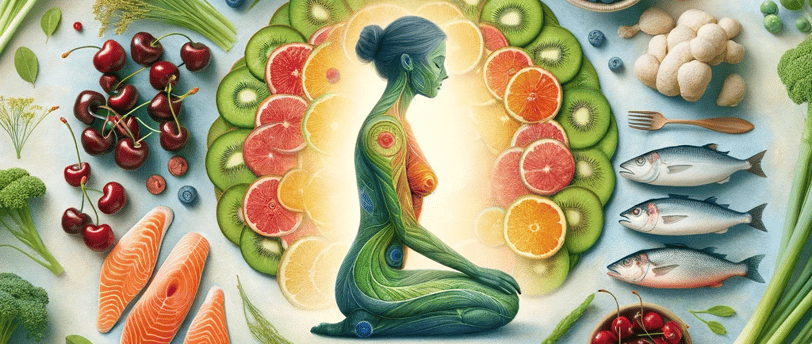Eating to Ease Ankylosing Spondylitis: A Guide to Healthy Inflammatory Foods
The Role of Diet in Managing Ankylosing Spondylitis
ANKYLOSING SPONDYLITIS
Fully Livin
10/30/20233 min read


Eating to Ease Ankylosing Spondylitis: A Guide to Healthy Inflammatory Foods
Ankylosing Spondylitis (AS) is a chronic inflammatory condition that primarily affects the spine but can also involve other joints and organs. While there is no cure for AS, dietary choices can play a crucial role in managing inflammation and potentially easing symptoms. In this comprehensive guide, we'll explore the impact of diet on Ankylosing Spondylitis, the role of inflammation, and provide a detailed list of healthy foods to incorporate into your diet to help control the condition.
Introduction
Ankylosing Spondylitis is characterized by chronic inflammation, primarily in the spine, which can lead to pain, stiffness, and decreased mobility. While medical treatment is a cornerstone of managing AS, dietary choices can complement traditional therapies, potentially reducing inflammation and improving overall well-being.
Understanding Inflammation in Ankylosing Spondylitis
Inflammation is a fundamental aspect of AS. The body's immune system mistakenly attacks its own tissues, causing chronic inflammation primarily in the spine and other joints. This inflammation can lead to pain and damage in the affected areas.
The Role of Diet in Managing Ankylosing Spondylitis
Diet plays a vital role in managing AS by addressing inflammation and overall health. The right foods can potentially reduce inflammation, boost the immune system, and provide essential nutrients for optimal well-being. Here's how diet can help:
1. Reducing Inflammation:
Certain foods possess anti-inflammatory properties, which can help counteract the chronic inflammation associated with AS.
2. Supporting Immune Function:
A balanced diet can strengthen the immune system, making it more efficient in managing inflammation.
3. Weight Management:
Maintaining a healthy weight can alleviate stress on the spine and joints, reducing the severity of symptoms.
4. Managing Medications:
Diet can interact with medications, either enhancing or reducing their effectiveness. Being mindful of your diet can help maximize the benefits of your prescribed medications.
Healthy Inflammatory Foods for Ankylosing Spondylitis
Incorporating anti-inflammatory foods into your diet can make a significant difference in managing AS. Here is a list of healthy foods to consider:
1. Fatty Fish:
Salmon, mackerel, and sardines are rich in omega-3 fatty acids, which have strong anti-inflammatory properties.
2. Leafy Greens:
Spinach, kale, and Swiss chard are packed with vitamins, minerals, and antioxidants that can help reduce inflammation.
3. Berries:
Blueberries, strawberries, and raspberries are rich in antioxidants that combat inflammation.
4. Nuts and Seeds:
Almonds, walnuts, and flaxseeds provide healthy fats and anti-inflammatory compounds.
5. Turmeric:
Curcumin, the active compound in turmeric, is a potent anti-inflammatory agent.
6. Ginger:
Ginger contains gingerol, which has anti-inflammatory and analgesic (pain-relieving) properties.
7. Green Tea:
Green tea is abundant in polyphenols that possess anti-inflammatory effects.
8. Whole Grains:
Whole grains like brown rice, quinoa, and whole wheat provide fiber and essential nutrients.
9. Olive Oil:
Extra-virgin olive oil contains oleocanthal, which has anti-inflammatory effects similar to ibuprofen.
10. Garlic:
Garlic has sulfur compounds that exhibit anti-inflammatory properties.
11. Citrus Fruits:
Oranges, lemons, and grapefruits provide vitamin C and antioxidants.
12. Avocado:
Avocado is packed with monounsaturated fats and antioxidants.
13. Cherries:
Cherries contain anthocyanins, which are known for their anti-inflammatory effects.
14. Beets:
Beets are rich in betalains, antioxidants with potential anti-inflammatory properties.
15. Probiotic Foods:
Fermented foods like yogurt, kefir, and sauerkraut can support gut health, potentially reducing inflammation.
Foods to Avoid
In addition to incorporating anti-inflammatory foods, it's essential to be mindful of foods that can trigger inflammation and worsen AS symptoms. These include:
Processed foods: High in trans fats, sugar, and refined carbohydrates, processed foods can increase inflammation.
Sugary beverages: Sugary drinks can promote inflammation and contribute to weight gain.
Red meat: High consumption of red meat, particularly processed and fatty cuts, may worsen inflammation.
Dairy: Some individuals with AS may be sensitive to dairy products, which can trigger inflammation.
Nightshades: Tomatoes, potatoes, peppers, and eggplants, known as nightshades, contain solanine, which can exacerbate inflammation in some people.
Gluten: While not all individuals with AS are sensitive to gluten, some may experience improved symptoms by reducing gluten intake.
Personalizing Your Diet
Ankylosing Spondylitis is a highly individualized condition, and what works best for one person may not be the same for another. Therefore, it's essential to work with a healthcare provider or a registered dietitian to personalize your dietary plan based on your specific needs and sensitivities.
Conclusion
While there is no cure for Ankylosing Spondylitis, adopting a diet rich in anti-inflammatory foods and avoiding potential triggers can significantly impact your overall well-being. Dietary choices should be viewed as a complementary approach to traditional medical treatments. By making informed choices about what you eat, you can help manage inflammation, alleviate symptoms, and improve your quality of life while living with AS.
